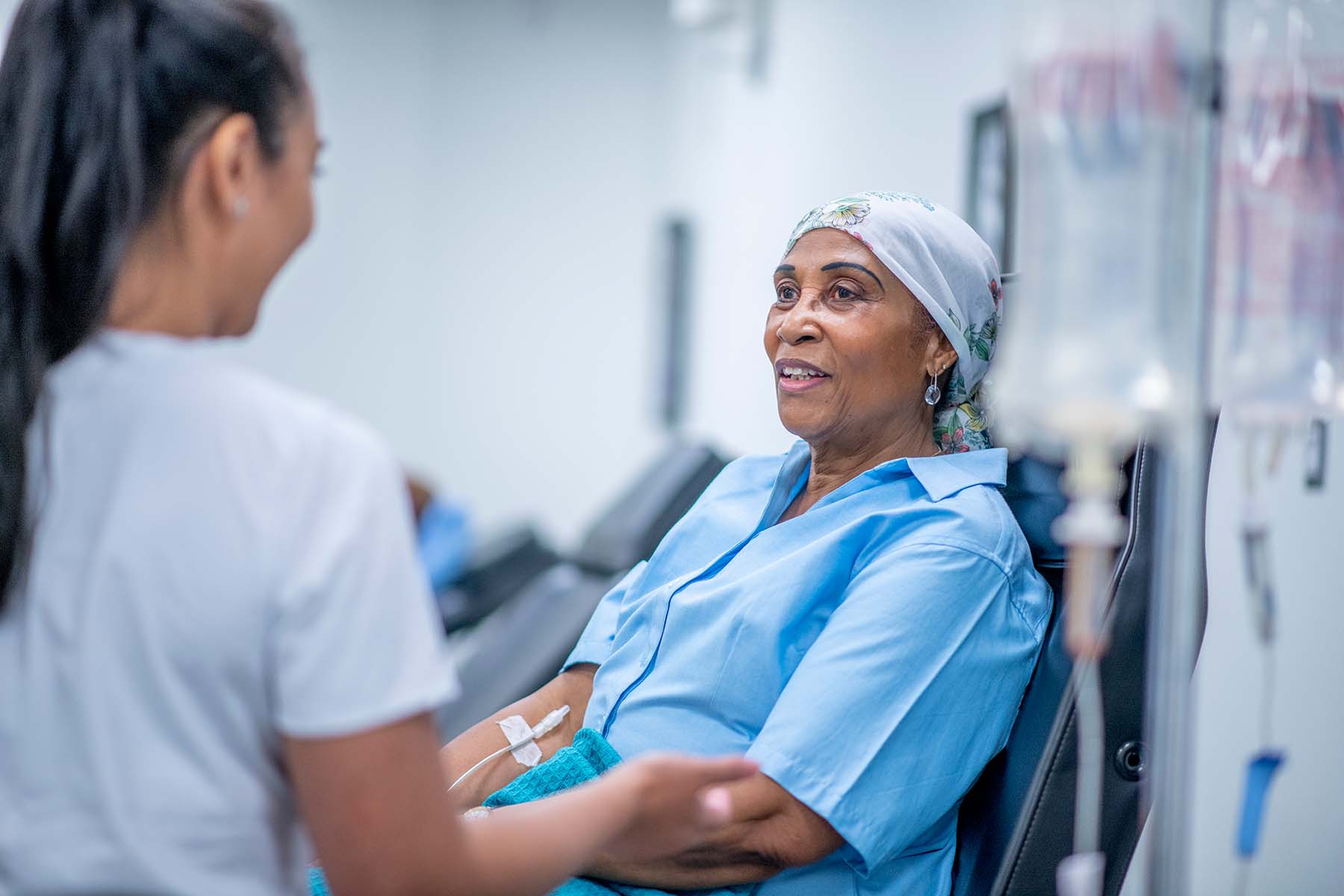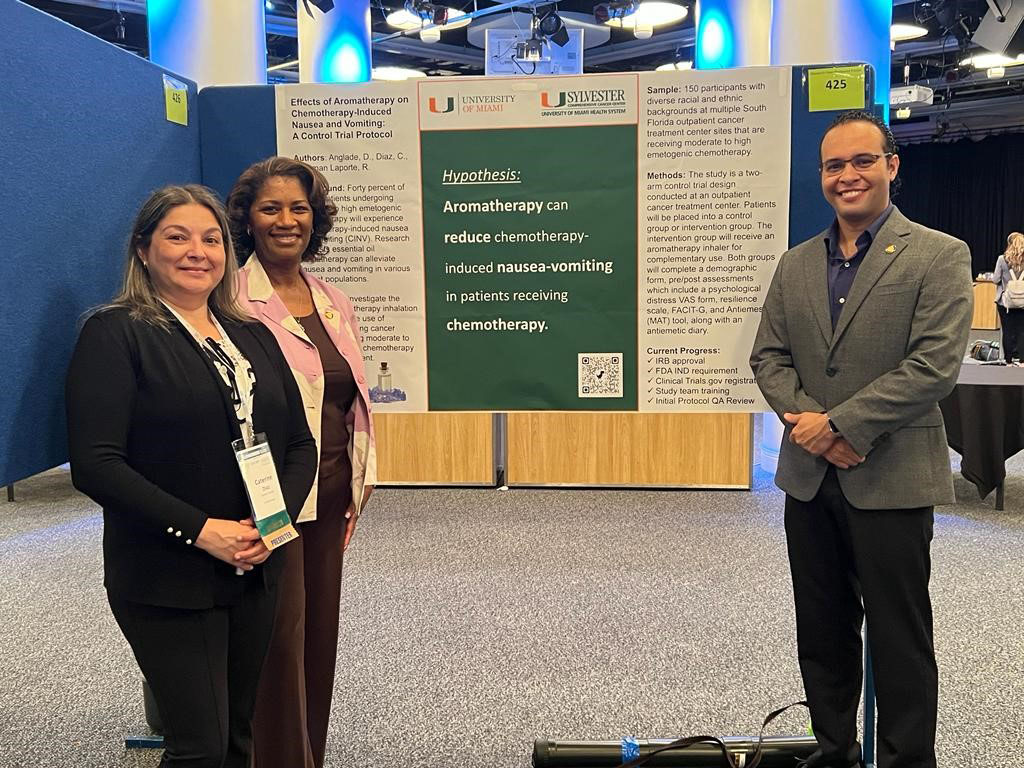Nurse Researchers: Can Aromatherapy Ease Chemo-Induced Nausea?

Caterine Diaz, a registered nurse at Sylvester Comprehensive Cancer Center, was attending a medical conference in Orlando when she heard a presentation about patients using aromatherapy to ease their anesthesia-induced nausea following major surgeries.
Diaz wondered if those same treatments could help her patients back in Miami who suffer crippling nausea from chemotherapy.
She asked the presenters, but they had no experience using aromatherapy on cancer patients. Diaz later discovered that very few researchers had studied the possibility.
That’s when Diaz decided to do her own study.
Now, she’s leading a comprehensive, year-long study to test whether aromatherapy can ease chemotherapy-induced nausea. The goal, she says, is to find a natural remedy to help cancer patients whose nausea can be so debilitating that they lose their appetite, suffer severe weight loss, or quit chemotherapy altogether.
“The patients, they suffer so much, and we can’t do much to help them,” she said, explaining that nurses in her unit have only a handful of medications to offer their patients.
“We created this project to try and fix those problems.”
Aromatherapy is an ancient practice of inhaling essential oils to improve physical or psychological well-being. In the days of the Egyptians and Greeks, people burned oils to disseminate the chemicals. Today, mechanical diffusers are so common that they’re sold in convenience stores and are widely available online.
Yet only a handful of cancer researchers have tested whether the practice can help cancer patients.
That caught the attention of Dr. Debbie Anglade, a Nurse Research Scientist at the University of Miami Hospitals and Clinics who oversees nurse-led research projects.

Dr. Anglade helped Diaz prepare the framework of the study, which will include 150 patients suffering from chemotherapy treatments that cause moderate or high levels of nausea. The patients will be split into two groups – a control group receiving standard anti-nausea medication and a test group receiving a supplemental called “QueaseEASE.”
This over-the-counter aromatherapy mixture includes peppermint, ginger, lavender, and spearmint. The patients receiving the aromatherapy will record their experiences in a diary. After a year of study, the UM team will analyze the data to see if aromatherapy is helpful for this patient population.
Dr. Anglade and Diaz presented the idea to the university’s Nursing Research Evidence-Based Practice (NREBP) Council and the Institutional Review Board, which approved the study.
The two, and a group of staff nurses, are now conducting the study together. Their first volunteer patient started in August.
“I thought (Diaz’s proposal) was tremendous. If we can improve the quality of life of our patients, that would help them follow through with their treatments and, ultimately, get to where they’re in remission.
Dr. Anglade
Dr. Anglade warned chemotherapy patients not participating in the UM study to consult with their doctor before treating themselves.
Some patients are not good candidates for aromatherapy, including those who suffer from hormonal-sensitive cancers.
And the UM trial is still in the early phases, meaning they’re a full year away from thorough conclusions.
“I would caution patients to have a conversation with their physicians to see if a product were such that it would adversely impact them,” Anglade said.
But Dr. Anglade and Diaz are both excited about the possibilities of this study and the prospect of future nurse-led research. Anglade encourages more nurses across the UHealth system to develop their own research ideas since they interact with patients differently from surgeons and doctors.
“The difference is usually that nurse-led research is going to involve improving patient quality of life, versus medication trials,” run by physicians, Anglade said.
Diaz hopes her research project inspires other nurses to come up with their own.
Diaz, a nurse for 20 years, helped with other research projects in her previous place of employment in Miami. But this is the first project she conceived on her own. She encourages other nurses to take advantage of the assistance available to conceive and carry out their own research projects.
“I want to show the nurses that we can do anything, that we have a voice,” she said.
“We’re the ones seeing the problems at the bedside, and we have tons of ideas. But nurses don’t see themselves as scientists and don’t look for help like I did with Dr. Anglade. There is a lot of assistance available, as well as individuals like Dr. Anglade who are eager to coach and guide us in carrying out our projects.”
“So, if you don’t like something? Let’s conduct a study to change it.”
Alan Gomez is a contributing writer for UHealth’s news service.
Tags: delayed emesis, induced nausea and vomiting, nausea and vomiting cinv, nurse researchers, nurse-led research, patients experience, preventing chemotherapy induced nausea, treatment of cinv
